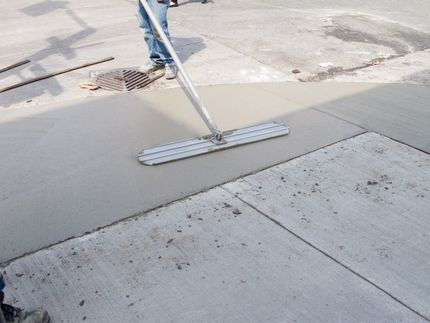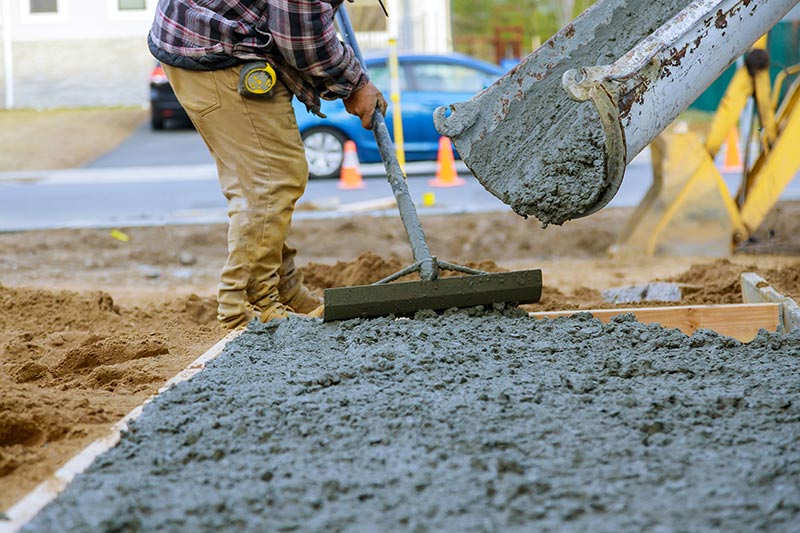Concrete Repair and Resurfacing in Alpharetta, GA
Concrete repair work and resurfacing in Alpharetta, GA, plays an essential function in preserving property stability. Cracks, spalling, and staining can interfere with both safety and security and aesthetics. Companies and house owners face decisions on whether to attend to these issues with specialist services or DIY approaches. Comprehending the subtleties of concrete damage and repair work methods can be crucial. The selection of materials and upkeep approaches can greatly impact long-term outcomes.
Understanding Concrete Damage
Concrete damages can materialize in different kinds, significantly affecting both looks and structural stability. Common types include fractures, spalling, and staining, each resulting from different reasons. Fractures may arise due to temperature level variations, wetness modifications, or ground motion, endangering the product's toughness. Spalling, defined by chipping or flaking, often occurs from freeze-thaw cycles or the visibility of de-icing chemicals, resulting in further damage if not addressed. Discoloration, which may stem from water seepage or bad mixing, can detract from the visual allure of concrete surfaces. In addition, the visibility of efflorescence, a white grainy substance, shows moisture issues that can compromise the concrete over time. Comprehending these different types of damage is vital for property proprietors, as it enables them to make informed choices about maintenance and repair service approaches, eventually protecting the performance and look of their concrete structures.
Signs Your Concrete Demands Repair
Concrete surface areas can exhibit several indicators suggesting the demand for repair work. Notable problems include visible cracks and fractures, uneven surface areas that posture journey threats, and staining or staining that interferes with the aesthetic appeal. Acknowledging these indicators early can stop further damage and costly fixings.
Cracks and splits
When a homeowner notices cracks and fractures in their driveway or patio, it frequently signals that repair work is necessary. These flaws can arise from numerous elements, including temperature changes, wetness seepage, and settling of the structure. Splits may vary in size, varying from little hairline cracks to bigger, more worrying gaps. It is vital to deal with these issues promptly to stop additional damages. Neglecting cracks can bring about water seepage, which can worsen the trouble and compromise the concrete's honesty. If they are significant, house owners need to evaluate the intensity of the splits and think about expert evaluation. Timely fixings can extend the life expectancy of concrete surfaces and maintain the aesthetic appeals of the building.
Uneven Surface areas
Irregular surfaces in driveways and patio areas can be a clear sign that concrete repair is required. These irregularities usually materialize as increased or sunken locations, which can posture safety and security hazards, especially for lorries and pedestrians. The reasons for irregular concrete may include dirt disintegration, improper installation, or the natural settling of the ground underneath the surface. Homeowners ought to be attentive for indicators such as merging water, tripping risks, or visible splits that accompany the unevenness. Addressing these issues immediately not just enhances safety yet likewise preserves the overall visual of the residential property. Regular inspections can aid recognize these problems early, allowing for timely repair services and preventing further degeneration of the concrete.
Staining and Discoloration
Just how can staining and discoloration signal the demand for concrete repair? These visual indicators typically suggest underlying concerns that call for attention. Stains, such as corrosion or oil, can pass through the surface, signaling potential damages that might get worse gradually. Discoloration, usually arising from chemical direct exposure or moisture infiltration, can compromise the honesty of the concrete. When the surface area shows up unevenly colored or shows consistent dark spots, it may indicate that the concrete is encountering or absorbing unwanted substances degeneration. Disregarding these indicators can bring about much more comprehensive repair services or substitutes down the line. Homeowners in Alpharetta need to recognize that dealing with staining and discoloration promptly can stop further damages and preserve the architectural and aesthetic integrity of their concrete surface areas.
Common Concrete Repair Techniques
Concrete repair service strategies are important for bring back the honesty and appearance of damaged surfaces. Different techniques are used depending upon the type and level of the damages. One common method is crack dental filling, which entails using a specialized filler to secure minor splits and prevent additional degeneration. For larger cracks, epoxy injection might be used, injecting epoxy material to bond and stabilize the concrete.

In situations of substantial structural problems, slab jacking may be needed, where a combination is pumped underneath the slab to raise and support it (legendary concrete alpharetta near me). By utilizing these strategies, building proprietors can effectively deal with concrete damages, making sure longevity and functionality
The Advantages of Concrete Resurfacing
Bring back harmed concrete surface areas not just enhances safety but additionally greatly enhances the overall visual allure of a property. Concrete resurfacing offers a number of benefits, making it a preferred choice amongst homeowner. This procedure entails applying a brand-new layer of material over existing concrete, which can successfully cover flaws, stains, and fractures.
Along with visual charm, resurfacing can extend the life of concrete surfaces, minimizing the need for much more considerable repairs in the future. It likewise gives a cost-efficient option contrasted to replacing the entire piece. In addition, resurfaced concrete can be tailored with numerous appearances and shades, allowing homeowner to achieve a preferred look that complements their landscape.
Additionally, resurfacing can enhance traction, lowering the risk of drops and slides, especially in high-traffic areas - concrete contractor map listing alpharetta. Overall, concrete resurfacing presents a practical, effective, and visually pleasing alternative for keeping and improving buildings
Picking the Right Materials for Fixing
Picking the appropriate materials for concrete repair service is vital for accomplishing long-term results. The selection of products significantly affects the longevity and performance of the repair work. Typical alternatives include epoxy and polyurethane materials, which offer strong bond and versatility, making them perfect for fracture repairs. For surface area remediation, polymer-modified overlays offer excellent bonding and can endure rough climate condition.
Furthermore, choosing the best accumulations is necessary for guaranteeing a constant texture and toughness. While Portland cement is a conventional option, combined cements can enhance longevity and resistance to environmental variables.
It is also essential to reflect on shade and finish, as these variables contribute to the general aesthetic of the concrete surface area. legendary concrete alpharetta alpharetta. Finally, recognizing the details requirements of the project, including load-bearing capacity and direct exposure conditions, will certainly guide the option of one of the most suitable materials for long-lasting and efficient concrete repair
Specialist vs. DIY Concrete Repair
When thinking about concrete fixing choices, the option between working with an expert and undertaking a do it yourself task offers various factors. Skills and expertise, price considerations, and the required tools and products play significant roles in this decision-making process. Each approach has its limitations and advantages, affecting the overall outcome and efficiency of the repair service job.
Skills and Competence Required
Concrete repair work and resurfacing requires an unique set of skills and proficiency that can vary significantly in between specialist service providers and do it yourself enthusiasts. Experts typically possess considerable training and experience, enabling them to analyze damages precisely and choose ideal fixing methods. They are well-informed about numerous materials and tools, guaranteeing high-quality outcomes that follow regional guidelines. On the other hand, do it yourself fanatics may lack formal training, counting on online resources or personal experience. While they can manage minor fixings properly, complex concerns commonly surpass their skill level, possibly leading to subpar end results. Ultimately, understanding the intricacies of concrete repair work is crucial for attaining long-term, visually pleasing results, making it vital to evaluate alternatives carefully prior to choosing an expert or do it yourself approach.
Price Factors To Consider and Spending Plan
Expense considerations play a critical role in determining whether to hire a specialist or take on a DIY concrete repair task. Specialists typically charge greater prices as a result of their time, equipment, and knowledge performance. This in advance investment often results in longer-lasting outcomes and warranties, which can save money in the future. Alternatively, do it yourself tasks may show up much more affordable, as home owners can prevent labor costs. However, the concealed expenses of materials, devices, and possible blunders can build up, making do it yourself less economical than at first assumed. Examining the scope of the repair, individual abilities, and budget plan restraints is essential for homeowners in Alpharetta, GA, to make an enlightened choice that straightens with their economic capabilities and desired outcome.
Devices and Materials Needed
A variety of tools and materials are vital for both specialist and DIY concrete repair jobs. Specialists normally utilize sophisticated devices such as concrete saws, grinders, and pneumatic tools to assure precision and performance. Their products often consist of high-grade sealers, epoxy injections, and specialized resurfacing compounds tailored for toughness. In contrast, DIY fanatics may select more easily accessible devices like trowels, mixers, and basic chisels, together with ready-mix concrete and patching compounds offered at local equipment stores. While experts benefit from experience and high-grade sources, do it yourself repair services can be reliable with cautious preparation and proper materials. Inevitably, the selection in between professional and do it yourself techniques will rely on the task range, skill level, and wanted result.

Maintenance Tips for Durability
Routine upkeep is essential for extending the life-span of concrete surfaces in Alpharetta. Routine evaluations must be carried out to recognize any type of splits, chips, or signs of wear. Early detection enables for timely repair work, avoiding additional damage. Cleaning is another key aspect; surface areas should be brushed up and washed routinely to get rid of dirt, debris, and organic growth local concrete contractor alpharetta that can wear away the product.
Applying a safety sealant every few years can considerably enhance toughness, giving a barrier against wetness and chemicals. Additionally, correct water drainage is vital to stay clear of water merging, which can lead to fracturing. During cold weather, utilizing de-icing agents moderately will safeguard the stability of the concrete versus freeze-thaw cycles. Preventing hefty loads on recently fixed or resurfaced locations warranties that the concrete keeps its stamina and longevity. Following these maintenance tips will assist maintain concrete surface areas for several years ahead.
Frequently Asked Concerns
Just How Lengthy Does Concrete Repair Usually Last?
Concrete repair work normally lasts between five to 10 years, depending upon elements such as ecological problems, quality of products utilized, and the degree of maintenance. Normal upkeep can significantly extend the life expectancy of repaired surface areas.
Can I Paint Over Resurfaced Concrete?
Yes, resurfaced concrete can be painted. Nevertheless, it is important to wait on the surface to heal appropriately and to utilize proper paint created for concrete to guarantee sturdiness and adherence.
What Is the Expense of Concrete Resurfacing?
The cost of concrete resurfacing normally ranges from $3 to $7 per square foot, depending on factors such as the problem of the surface area, the products used, and the intricacy of the project.
When Is the very best Time for Concrete Repair Work?
The very best time for concrete repair typically falls during completely dry, light weather, preferably in springtime or fall. This ensures perfect treating problems, stopping moisture-related problems and promoting far better attachment and sturdiness of the fixed surface.
Will Rainfall Affect the Healing Refine?
Rainfall can considerably influence the treating process of concrete, possibly causing inappropriate hydration, surface area issues, and weakened structural honesty. Making certain appropriate protection from moisture during the preliminary curing stage is important for ideal outcomes.
